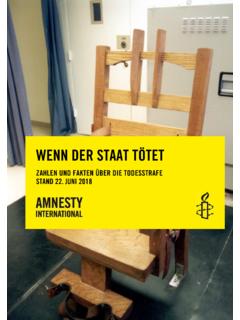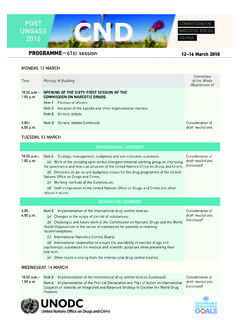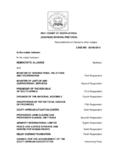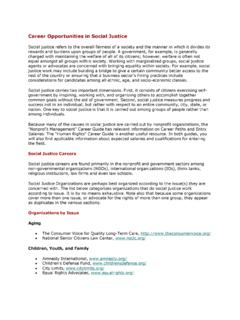Transcription of Proactive Complementarity: The International Criminal ...
1 \\server05\productn\H\HLI\49-1\ : 128-DEC-0714:21 VOLUME 49, NUMBER 1, WINTER 2008 Proactive complementarity : The InternationalCriminal court and National Courts in theRome System of International JusticeWilliam W. Burke-White*When the International Criminal court ( ICC or court ) was established in 2002, states, nongov-ernmental organizations ( NGOs ), and the International community had extraordinarily high expecta-tions that the court would bring an end to impunity and provide broad-based accountability forinternational crimes. Nearly five years later, those expectations remain largely unfulfilled due to politicalconstraints, resource limitations, and the limited ability of the ICC to apprehend suspects. This articleoffers a novel solution to the misalignment between the court s limited resources and legal mandate on theone hand and the lofty expectations for it on the other, arguing that the court must engage more activelywith national governments and must encourage states to undertake their own prosecutions of internationalcrimes.
2 It advocates a shift in the ICC s role through a policy of Proactive complementarity , whereby theCourt would encourage and at times assist states in undertaking domestic prosecutions of internationalcrimes. The article examines the legal mandate for such a policy, considers the political constraints on theCourt, offers a practical framework for the implementation of Proactive complementarity in the range ofcircumstances the ICC is likely to face, and documents examples of Proactive complementarity in the ICC sinitial operations. Overall, the article argues that encouraging national prosecutions within the RomeSystem of Justice and shifting burdens back to national governments offer the best and perhaps the onlyways for the ICC to meet its mandate and help end INTRODUCTIONThe establishment of the International Criminal court in 2002 was ac-companied by extraordinary optimism for the prospects of internationalcriminal justice.
3 After the sixtieth state ratified the Rome Statute in April2002, Secretary-General Kofi Annan announced that [i]mpunity has* Assistant Professor of Law, University of Pennsylvania School of Law; Harvard Law School, ; Cambridge University, 2006. The author wishes to thank Luis Moreno-Ocampo and theJurisdiction, Cooperation and complementarity Division of the ICC, particularly Paul Seils, Rod Raston,Wilbert von Hovel, and Silvia Fern andez de Gurmendi, for their insight and assistance. Thanks are dueto those who read or commented on earlier drafts of this work, including William Schabas, ColleenBurke, Jenia Turner, Michael Scharf, Carsten Stahn, Veronica Hinsetroza, the participants in the Viennameeting of the Association of European Human Rights Institute, and the Asser Institute/Univer-sity of Leiden Seminar. The author is grateful for research assistance from Adam Pollock and MaryamJamshidi.
4 Enormous debt is due to Mohamed El Zeidy for his ideas and contributions. For financialsupport, the author thanks the University of Pennsylvania Faculty Summer Research Program. ProfessorBurke-White can be reached at Although the author has served as a visitingscholar in the Office of the Prosecutor of the International Criminal court , the ideas expressed in thispaper are attributable exclusively to the author.\\server05\productn\H\HLI\49-1\ : 228-DEC-0714:2154 Harvard International Law Journal / Vol. 49been dealt a decisive blow. 1 States, nongovernmental organizations, and theglobal public all had high expectations for the new court s ability to providewidespread accountability for International These high hopeslargely failed to reflect the reality of the ICC s modest capabilities. Whereasthe preamble to the Rome Statute anticipates that the court should help put an end to impunity for the perpetrators of.
5 [ International ] crimes, the capacity of the court and the limited resources made available to itsuggest that it will, at best, make a far more limited contribution to the legal mandate of the ICC nor the resources available to it aresufficient to allow the court to fulfill the world s high expectations. Theglobal community expects the ICC to provide worldwide accountability, yetthe court s own internal predictions and the current level of funding fromthe Assembly of States Parties ( ASP or Assembly ) anticipate a maxi-mum of two to three trials per In addition, the court optimisticallyassumes that states will cooperate in the arrest and surrender of combination of unrealistic hopes and limited capacity raises the realprospect that the court will be seen as a failure only a few years after itscreation. Any limited contribution it may make will inevitably fall short ofthe global community s high a potential solution to this misalignment of expectations, mandate,and resources, the ICC could participate more directly in efforts to en-courage national governments to prosecute International crimes solution, predicated upon the ICC s ability to motivate and assist na-tional judiciaries, could be termed Proactive complementarity .
6 4 Undersuch a policy, the ICC would cooperate with national governments and usepolitical leverage to encourage states to undertake their own prosecutions ofinternational crimes. In order for the court to meet expectations, nationalgovernments must fulfill their obligations to provide accountability. The1. Press Release, Office of the Secretary-General, Transcript of Press Conference with President CarloCiampi of Italy and Secretary-General Kofi Annan in Rome and New York by Videoconference, SG/SM/8194 (Apr. 11, 2002) (following ratification of the Rome Statute of the International Crim-inal court in Rome, Italy). infra Part This prediction is based on the average trial length at similar International tribunals, such as theInternational Criminal Tribunal for the former Yugoslavia ( ICTY ), where many trials have taken ayear or more. While the ICC does have three simultaneously operating trial chambers, it presently hasonly one courtroom available, limiting the potential sitting time of any particular chamber.
7 See infra The term positive complementarity is used by some commentators to describe a similar policyapproach. Proactive complementarity , however, better reflects the nature of the policy and better high-lights its distinction from the court s present approach that might be termed passive complementar-ity. See Payam Akhavan, The Lord s Resistance Army Case: Uganda s Submission of the First State Referral tothe International Criminal court , 99 AM. J. INT L L. 403, 413 (2005) (referring to a positive interpretationof complementarity ). Various NGOs have also used the term positive complementarity . See, , Chris-topher Keith Hall, Amnesty International , Statement at the Second Public Hearing of the Office of theProsecutor (Sept. 26, 2006), available at \\server05\productn\H\HLI\49-1\ : 328-DEC-0714:212008 / Proactive Complementarity55formal adoption of a policy of Proactive complementarity would help theICC come far closer to meeting expectations with its limited assuming office in 2003, the ICC s Prosecutor, Luis Moreno-Ocampo, stated, [a]s a consequence of complementarity , the number ofcases that reach the court should not be a measure of its efficiency.
8 On thecontrary, the absence of trials before this court , as a consequence of theregular functioning of national institutions, would be a major success. 5 Similarly, in an address to the diplomatic corps at The Hague in 2004, theProsecutor noted that a key strategic priority would be to take a positiveapproach to complementarity . Rather than competing with national systemsfor jurisdiction, we will encourage national proceedings wherever possible. 6 The Prosecutor s statements embody the concept of Proactive complemen-tarity, according to which the Office of the Prosecutor ( OTP ) will, in theright circumstances, encourage national governments to undertake theirown investigations and prosecutions of crimes within the court these early statements, the Prosecutor appears to have movedaway from a policy of Proactive complementarity , instead focusing the OTPon the direct prosecution of International As the Prosecutor ex-plained in a major policy address in June 2007, I was given a clear judicialmandate.
9 My duty is to apply the law without political considerations. I willpresent evidence to the Judges and they will decide on the merits of suchevidence. 9 The Prosecutor noted that he would neither attempt to adjusthis approach based on political considerations nor respond to or alter thepolicies of national governments. He stated thatfor each situation in which the ICC is exercising jurisdiction, we canhear voices challenging judicial decisions, their timing, their timeli-ness, asking the Prosecution to use its discretionary powers to adjust tothe situations on the ground.. These proposals are not consistentwith the Rome Statute. They undermine the law States Parties com-mitted to. 10To date, the ICC has not, at least intentionally, engaged in a policy ofproactive complementarity . Nor has it strategically used the various tactics5.
10 Luis Moreno-Ocampo, Prosecutor of the ICC, Statement Made at the Ceremony for the SolemnUndertaking of the Chief Prosecutor of the International Criminal court (June 16, 2003), available Luis Moreno-Ocampo, Prosecutor of the ICC, Statement of the Prosecutor to the Diplomatic Corps(Feb. 12, 2004), available at Christopher Keith Hall, The Powers and Role of the Prosecutor of the International Criminal court in theGlobal Fight Against Impunity, 17 LEIDEN J. INT L L. 121, 135 36 (2004). Luis Moreno-Ocampo, Prosecutor of the ICC, Building a Future on Peace and Justice, Addressat the International Conference in Nuremberg (June 24 25, 2007), available at \\server05\productn\H\HLI\49-1\ : 428-DEC-0714:2156 Harvard International Law Journal / Vol. 49developed in this article that could further such a policy. The court s failureto use consciously its power to catalyze national prosecutions is a potentiallydangerous mistake.









